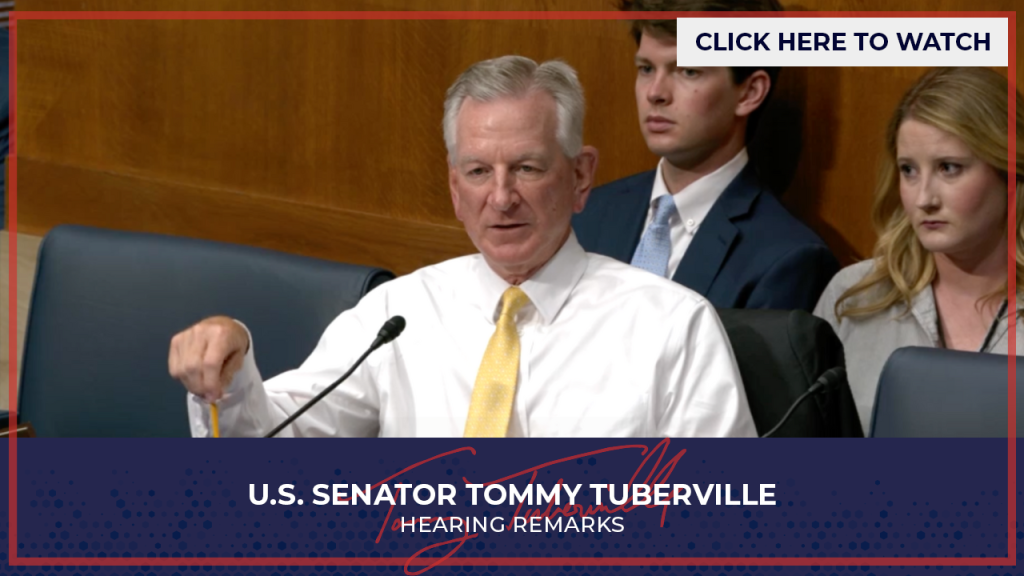WASHINGTON – Today, U.S. Senator Tommy Tuberville (R-AL) spoke with Dr. Jacqueline Corrigan-Curay, Acting Director of the Center for Drug Evaluation and Research at the United States Food and Drug Administration, during a Senate Health, Education, Labor, and Pensions (HELP) Committee hearing. During the hearing, Sen. Tuberville emphasized the importance of producing over-the-counter drugs right here in America and of making sure cancer-causing ingredients aren’t found in sunscreen products.
Read Sen. Tuberville’s remarks below or watch on YouTube or Rumble.

ON LABELING OVER-THE-COUNTER DRUGS:
TUBERVILLE: “We’ve already talked a little bit about dyes, some things that—[there are] sweeteners that go into a lot of our over-the-counter drugs. You go into these places and the drugstores look like a candy store, and they are enticed to be marketed in certain ways because of the color. […] What kind of priorities do we have on labeling of number one, what goes into the, you know, some of the over-the-counter drugs, where they’re made. I’ve looked at a lot of bottles and things inside of our stores and you can’t find out whetherthey’re made in Korea, whether they’re made in China, whether they’re made in the United States. Shouldn’t that be a priority?”
CORRIGAN-CURAY: “Thank you for that question. One thing when we think about where a drug is made, we are committed to making sure that wherever the drug is made and if it’s being marketed is safe. So, we apply the same standards, whether it’s made domestically or it’s made internationally. We certainly are very supportive. I know the administration is looking to onshore pharmaceutical manufacturing and that would be for prescriptions or for OTC and we’re very supportive of that and we’ll work with them in terms of our regulatory frameworks to help make that happen. But right now, we don’t have a labeling on the drug for where it’s made. We’re happy to work with you if that’s a priority.”
TUBERVILLE: “Well, I think in the future, with the problems we’re having worldwide, I think it’d probably a good suggestion that people, when they go in, they find out where it’s made. We found out during COVID, we don’t make much anymore. Most of it comes from China. And we really don’t know what’s in it, you know, which [we are] finding out now a lot of metals and things are in a lot of the drugs and even the foods that we have.”
ON POTENTIALLY HARMFUL SUNSCREENS:
TUBERVILLE: “Another question I had is about sunscreen. Most of us use sunscreen. I don’t know how it’s evaluated. But over the years, [the] last fifty years, melanoma and skin cancers have almost quadrupled. And I don’t know whether people don’t use it or it’s not working. Or we get some kind of skin cancer from ingredients that are in sunscreens because all of us use it at some point. Doesn’t really feel safe every time I put it on, but I put it on because sometimes you know, you look at the worst case scenario. So, what’s your thoughts on that?”
CORRIGAN-CURAY: “Yeah, thank you for that. First of all, we’re very aware that, you know, skin cancer risk is a very serious problem. And the sunscreens we have, the testing does say they are effective if used properly, and some of our tests when we’re testing for systemic absorption is how you use them. We do have two sunscreens that are mineral sunscreens that are grasped, they’re not absorbed. For those that [are] absorbed, we’ve asked for additional tests just to assure their safety that that systemic absorption has nountoward effects.”
TUBERVILLE: “Are we looking into the ingredients that are so-called cancer causers? I would hope we would be—”
CORRIGAN-CURAY: “Yes.”
TUBERVILLE: “We here read [about] it all the time.”
CORRIGAN-CURAY: “Sorry to interrupt. Yes. And part of the testing that we want to do whenever a drug is absorbed and it reaches systemic levels is a test for tumor formation.”
TUBERVILLE: “Thank you.”
Senator Tommy Tuberville represents Alabama in the United States Senate and is a member of the Senate Armed Services, Agriculture, Veterans’ Affairs, HELP and Aging Committees.
###